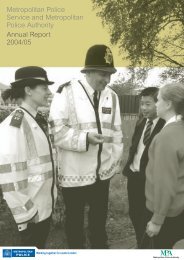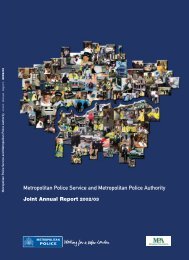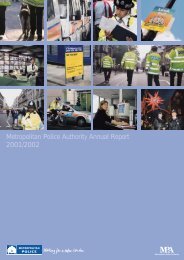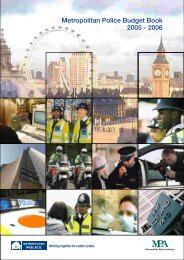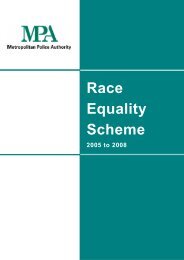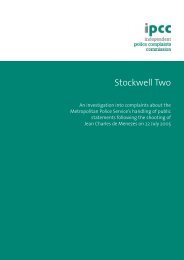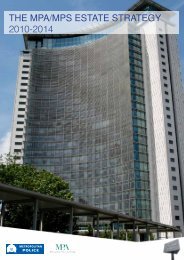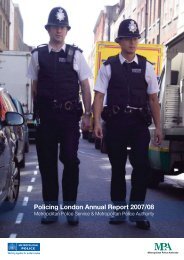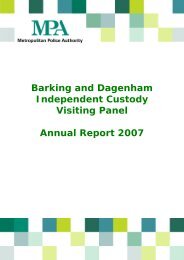MPA Annual Governance Report
MPA Annual Governance Report
MPA Annual Governance Report
Create successful ePaper yourself
Turn your PDF publications into a flip-book with our unique Google optimized e-Paper software.
<strong>Annual</strong> governance report<br />
Metropolitan Police Authority<br />
Audit 2010/11<br />
Audit Commission <strong>Annual</strong> governance report 1
Contents<br />
Key messages..............................................................................................................................................................3<br />
Before I complete my audit.........................................................................................................................................4<br />
Financial statements ...................................................................................................................................................5<br />
Financial statements .................................................................................................................................................10<br />
Value for money.........................................................................................................................................................13<br />
Appendix 1 – Draft auditor’s report to Members of the Metropolitan Police Authority ......................................16<br />
Appendix 2 – Amendments to the draft financial statements ...............................................................................20<br />
Appendix 3 – Draft letter of representation.............................................................................................................26<br />
Appendix 4 – Action plan..........................................................................................................................................29<br />
Traffic light explanation overleaf<br />
Red Amber Green<br />
Audit Commission <strong>Annual</strong> governance report 2
Key messages<br />
This report summarises the findings from the 2010/11 audit which is substantially complete.<br />
It includes the messages arising from my audit of your financial statements and the results of<br />
the work I have undertaken to assess your arrangements to secure value for money in your use<br />
of resources.<br />
Unqualified audit opinion<br />
Proper arrangements to secure value for money<br />
Audit opinion<br />
Our findings<br />
1 I am nearing completion of my work on the financial statements.<br />
Subject to the satisfactory completion of outstanding audit work I<br />
propose to give an unqualified opinion on the 2010/11 financial<br />
statements by the deadline of 30 September 2011. I expect to issue my<br />
certificate to close the 2010/11 audit at the same time. My draft opinion<br />
is at Appendix 1 and I have listed the outstanding audit work at the date<br />
of this report in paragraph 6 below.<br />
Financial statements<br />
2 The Authority submitted its financial statements for audit by the<br />
deadline of 30 June 2011. <strong>MPA</strong>/S Finance staff have managed the firsttime<br />
adoption of International Financial <strong>Report</strong>ing Standards (IFRS)<br />
well. My audit testing found the Authority had accounted for all<br />
significant changes arising under IFRS correctly, including accounting<br />
for leases and employee benefits due at the balance sheet date.<br />
3 Management has adjusted the financial statements for 12<br />
amendments identified during the audit. These amendments are<br />
presentational in nature and do not affect the Authority's reported<br />
financial position or available reserves but they are of a value that I am<br />
required to report to you. I have provided details of these amendments<br />
in Appendix 2 of this report.<br />
Value for money<br />
4 I am satisfied that in all significant respects the Authority has proper<br />
arrangements to secure economy, efficiency and effectiveness in its<br />
use of resources for the year ended 31 March 2011. I therefore expect<br />
to issue an unqualified value for money conclusion by 30 September<br />
2011. My draft conclusion is at Appendix 1.I have set out the key<br />
findings and recommendations from my work on pages 13 to 15 below.<br />
Audit Commission <strong>Annual</strong> governance report 3
Before I complete my audit<br />
I confirm to you<br />
My report includes only matters of governance interest that have come to my attention in performing my audit.<br />
My audit is not designed to identify all matters that might be relevant to you.<br />
Independence<br />
I can confirm that I have complied with the Audit Practice Board's ethical standards for auditors, including ES 1<br />
(revised) - Integrity, Objectivity and Independence. I can also confirm there were no relationships resulting in a<br />
threat to independence, objectivity and integrity.<br />
During the year the Audit Commission's Audit Practice undertook non-audit work for the Authority for a fee of<br />
£29,000. We delivered ten fraud awareness workshops to 350 senior MPS officers and managers as part of the<br />
<strong>MPA</strong>'s and MPS's joint Anti-Fraud Strategy.<br />
I ask you to confirm to me<br />
I ask the Authority to:<br />
■ note the adjustments to the financial statements which are set out in this report (Appendix 2);<br />
■ approve the letter of representation, provided alongside this report, on behalf of the Authority before I issue<br />
my opinion and conclusion (Appendix 3); and<br />
■ agree your response to the proposed action plan (Appendix 4).<br />
Audit Commission <strong>Annual</strong> governance report 4
Financial statements<br />
The Authority's financial statements and annual governance statement are important means by which the<br />
Authority accounts for its stewardship of public funds. As Authority members you have final responsibility for<br />
these statements. It is important that you consider my findings before you adopt the financial statements and<br />
the annual governance statement.<br />
Opinion on the financial statements<br />
5 Subject to satisfactory clearance of outstanding matters listed at paragraph 6 below, I plan to issue an audit report including an unqualified opinion<br />
on the financial statements by 30 September 2011. Appendix 1 contains a copy of my draft audit report.<br />
Status of audit work<br />
6 The following areas of audit work are outstanding at the date of my report:<br />
− testing the Authority's group accounts submission to the GLA and Whole of Government Accounts (WGA) submission to Communities and<br />
Local Government;<br />
− reviewing a revised set of statements to ensure finance officers have made all agreed audit adjustments; and<br />
− receiving the signed Letter of Representation following Authority consideration on 15 September 2011.<br />
7 I expect to complete all outstanding work before 30 September 2011. Should any significant matters arise in finishing the outstanding work, I will<br />
raise them with the <strong>MPA</strong> Treasurer, MPS Director of Resources and the Chair of the Corporate <strong>Governance</strong> Committee.<br />
Letter of representation<br />
8 Before I issue my opinion, auditing standards require me to ask you and management for written representations about your financial statements<br />
and governance arrangements. Appendix 3 contains the draft letter of representation.<br />
Audit Commission <strong>Annual</strong> governance report 5
Financial statements<br />
Quality of the financial statements<br />
The Authority submitted its financial statements to audit by the deadline of 30 June 2011. Working papers<br />
provided to support the accounts have continued to be of a good quality this year. Finance staff have worked<br />
effectively with the audit team to ensure the prompt resolution of audit queries.<br />
International Financial <strong>Report</strong>ing Standards<br />
9 Police authorities, in common with other local government bodies, were required to prepare their financial statements in line with International<br />
Financial <strong>Report</strong>ing Standards (IFRS) for the first time in 2010/11. IFRS requirements differ significantly from UK Generally Accepted Accounting<br />
Practice (UK GAAP) which authorities have prepared their accounts under in previous years in several respects, more details of which are in Table 2<br />
below.<br />
10 IFRS adoption has been a significant exercise because the CIPFA Code requires retrospective adoption of the new standards covering areas like<br />
PFI and leases. This has required finance officers to review PFI contracts and lease agreements and, where necessary, restate accounting entries from<br />
the beginning of these agreements onwards. To prepare for IFRS, authorities have needed robust project plans to ensure they can collect and review<br />
the necessary information to restate balances, often with considerable lead-in times, and agree these with auditors at an early stage. In some areas of<br />
the financial statements, significant judgements are required in interpreting international standards and their applicability to local circumstances. <strong>MPA</strong>/S<br />
finance officers have set out the significant judgements made in preparing the Authority’s financial statements at 1.2 of the accounting policies.<br />
11 I am satisfied the Authority has prepared for IFRS well. I reviewed management's arrangements for preparing for the transition to IFRS and<br />
concluded these were robust. There has been good, timely communication of proposed accounting changes with my audit team. I have audited all<br />
material adjustments made in the financial statements relating to IFRS. This work found that finance officers had adopted all expected accounting<br />
changes correctly with no significant errors identified. I am therefore satisfied the Authority has restated its financial statements correctly in line with<br />
IFRS requirements. My audit did however identify some presentational adjustments which management has agreed to correct which I have outlined<br />
below.<br />
Audit Commission <strong>Annual</strong> governance report 6
Adjustments to the financial statements<br />
12 I calculated materiality for my audit to be £47,483k based on the Authority's General Fund balance at 31 March 2011 in line with the Audit<br />
Commission's Audit Approach. I set my triviality level at £475k based on 1 per cent of materiality. In accordance with ISA+ 320, information is 'material'<br />
to the financial statements if its omission or misstatement could influence the economic decisions of users taken on the basis of the financial<br />
statements.<br />
13 I identified 12 amendments in the financial statements which I consider non-trivial and which management has agreed to correct. All of these<br />
amendments are presentational in nature and do not affect the Authority's reported financial performance or reserves position. I have listed each of the<br />
agreed amendments in Appendix 2. I identified no further errors that management has not agreed to correct.<br />
Accounting practices<br />
14 I consider your accounting practices, accounting policies, accounting estimates and financial statement disclosures. Except for the issue in Table 1<br />
below I am satisfied the Authority has complied with the proper practices in the IFRS-based CIPFA Code of Practice in preparing its financial<br />
statements.<br />
Table 1: Accounting practices, policies and estimates and financial statement disclosures<br />
Issue<br />
Note 20: Long-term<br />
debtors<br />
Finding<br />
The Authority's long-term debtors on the Balance Sheet include a £2.2 million in respect of the National Offenders<br />
Management Service (NOMS). This balance has existed since 2000 relating to borrowing undertaken by the MPS on<br />
behalf of the Inner London Probation Service, which ceased to exist in 2001. Its functions were subsequently transferred to<br />
NOMS.<br />
Management is in continuing discussion with NOMS and believes the £2.2 million is collectable. However, at the date of my<br />
report these discussions had not resulted in the payment of this balance to the Authority by NOMS. Given the time since<br />
the MPS raised this debt it is important this issue is resolved promptly, especially as the Police and Social Responsibility<br />
Bill is likely to require the transfer of balances currently held by the Authority to the new Mayor's Office for Policing and<br />
Crime.<br />
Recommendation<br />
R1 Review the collectability of £2.2 million of overdue debt with the National Offenders Management Service with the aim of either collecting the<br />
amount due or writing it off.<br />
Audit Commission <strong>Annual</strong> governance report 7
Financial statements<br />
Key areas of judgement and audit risk<br />
In planning my audit I identified specific risks and areas of judgement that I have considered in addition to my<br />
normal audit procedures. Table 2 summarises the work I have undertaken in response to the specific audit<br />
risks in my 2010/11 Audit Plan which I reported to the <strong>MPA</strong> Corporate <strong>Governance</strong> Committee on 10 March<br />
2011.<br />
Table 2: Key areas of judgement and audit risk<br />
Audit risk<br />
Financial outlook<br />
Public bodies face increasing pressure to deliver their financial plans during a period of<br />
reduced funding while still meeting demand for their services. In my 2010/11 Audit Plan<br />
I reported there was a risk that errors or deliberate manipulation of the Authority's<br />
income and expenditure could distort the Authority's true financial position.<br />
International Financial <strong>Report</strong>ing Standards<br />
The Authority produced financial statements in line with IFRS for the first time in<br />
2010/11. This change in the financial reporting framework has a significant impact in<br />
several accounting areas including:<br />
■ leases, with stricter criteria determining when leases should be accounted for on the<br />
Finding<br />
My audit included testing receipts and payments made in<br />
March and April 2011 and confirmed the Authority had<br />
accounted for all 2010/11 transactions correctly in the<br />
financial statements. I tested the assumptions used by<br />
management when making material estimates in the<br />
financial statements. My testing of debtor and creditor<br />
balances at 31 March 2011 identified no errors.<br />
I am therefore satisfied the Authority's income and<br />
expenditure reported in the financial statements is fairly<br />
stated.<br />
My audit of the Authority's restated 2009/10 statements and<br />
draft 2010/11 statements found the Authority has correctly<br />
identified and acted on all the accounting changes required<br />
by CIPFA's<br />
IFRS-based Code and in particular the changes listed in<br />
the previous column.<br />
Audit Commission <strong>Annual</strong> governance report 8
Audit risk<br />
Authority's balance sheet as 'finance leases';<br />
■ a new requirement to identify and depreciate material components of fixed assets<br />
separately; and<br />
■ liabilities relating to employee compensated absences mainly untaken holiday<br />
entitlements, which the Authority will need to calculate and include on its balance<br />
sheet.<br />
In my 2010/11 Audit Plan I reported there was a risk of material misstatement in the<br />
financial statements if these changes were not identified and accounted for correctly.<br />
Costs of organisational change<br />
The Authority has offered severance packages to certain groups of staff as one means<br />
of delivering the financial savings required in 2011/12 and beyond. Severance<br />
packages can be complex, politically sensitive and require careful accounting.<br />
In my 2010/11 Audit Plan I reported there was a risk of material misstatement in the<br />
financial statements if the Authority did not account for the liabilities arising from<br />
redundancies correctly.<br />
Finding<br />
Although there were a number of amendments required to<br />
the draft 2010/11 statements in relation to IFRS these were<br />
presentational in nature and did not affect the Authority's<br />
reported financial position. I am therefore satisfied the<br />
Authority has implemented IFRS first-time adoption well.<br />
My audit found that liabilities and potential liabilities arising<br />
from organisational change have been accounted for in line<br />
with relevant accounting standards and there are no issues<br />
to report.<br />
Post-balance sheet events<br />
15 Following the riots in London in August 2011 I have asked the Authority to disclose a non-adjusting post-balance sheet event for the potential<br />
insurance claims it will receive from third parties in respect of riot damages under the Riot (Damages) Act 1886. The Authority has also included a nonadjusting<br />
post-balance sheet event in the financial statements for the estimated £52 million of redundancy payments it has committed to make since 31<br />
March 2011.<br />
16 These additional disclosures relate to costs incurred in 2011/12 so are presentational only in the 2010/11 financial statements. They do not affect<br />
the Authority's reported financial performance for 2010/11 or reserves position at 31 March 2011.<br />
Audit Commission <strong>Annual</strong> governance report 9
Financial statements<br />
Material weaknesses in internal control<br />
My audit has identified no material control weaknesses that could result in a material error occurring in your<br />
financial statements. My review of Internal Audit's work confirmed this met quality standards allowing me to<br />
place reliance on it rather than perform additional testing of my own.<br />
Other weaknesses in internal control<br />
Director of Audit Risk and Assurance's <strong>Annual</strong> <strong>Report</strong><br />
17 The Director of Audit, Risk and Assurance presented her <strong>Annual</strong> <strong>Report</strong> for 2010/11 to the <strong>MPA</strong> Corporate <strong>Governance</strong> Committee on 7 July 2011.<br />
She concluded there had been a continued improvement in the internal control environment during 2010/11 but that overall the control environment is<br />
still not fully effective.<br />
18 The Authority is exposed to financial and reputational risks where management controls, for example those for recording and securing crime<br />
property, are not effective. It is therefore important that management continue to focus efforts on improving the internal control environment so the<br />
Authority's systems consistently operate as designed.<br />
Covert bank accounts<br />
19 The Authority’s covert bank accounts are included in its cash balance on the Balance Sheet. I tested these balances on a sample basis to confirm<br />
they are fairly stated. My testing identified no errors but did not provide complete assurance that covert balances are fairly stated because:<br />
− at the date of my audit the Authority had not yet reconciled 35% of its covert bank accounts to 31 March 2011 bank statements, although I note<br />
it plans to complete all reconciliations and that this work is ongoing. The Authority has focused on reconciling the accounts with the largest<br />
volume of transactions first, which is good practice; and<br />
− at the date of my audit the Authority had not reconciled the balances on its covert bank accounts to the balances reflected in its main<br />
accounting system and therefore its financial statements.<br />
Audit Commission <strong>Annual</strong> governance report 10
20 I understand that reconciling all accounts to bank statements logistically takes time to complete and it is not always possible to complete all such<br />
reconciliations in time for my audit. However, where all reconciliations have not been completed, preparing a separate reconciliation to confirm that the<br />
total of all individual covert bank accounts agrees to the headline covert balances in the main accounting system provides a useful cross-check for both<br />
management and audit to confirm the balances reflected in the main accounting system and therefore the financial statements are materially accurate.<br />
At the date of this report, the Authority had completed such a reconciliation for two of the five high-level covert balances in its main accounting system<br />
only.<br />
21 As a result I have not been able to conclude that all covert bank balances are correctly stated in the financial statements. I am satisfied these<br />
balances are not material to the financial statements in total. However, I have asked management to confirm in the Letter of Representation that the<br />
accounting records maintained for covert transactions are materially accurate.<br />
Recommendation<br />
R2 Strengthen accounting arrangements for covert bank accounts by reconciling the total value of covert bank account balances to the headline covert<br />
balances in the main accounting system trial balance at 31 March.<br />
IT control environment<br />
22 I carried out audit work on the Authority's IT environment insofar as it relates to the financial systems used in preparing the financial statements. I<br />
am satisfied the IT control environment is well controlled overall but identified two areas where controls could be strengthened further which I have<br />
summarised below.<br />
External assurance over outsourced IT providers<br />
23 My audit considered the controls in place over areas of the Authority's third-party suppliers CapGemini for IT service provision and LogicaCMG for<br />
payroll and pensions. I am satisfied the Authority has appropriate in-house controls to prevent material error occurring in the financial statements<br />
because of any control weaknesses that may be present in these third parties' processes. However, the Authority should also seek independent<br />
assurance over the control environment in place at CapGemini and LogicaCMG. This normally takes the form of a 'SAS 70' or equivalent report<br />
provided by the suppliers' external auditor and would provide management with further assurance that its IT service providers has robust controls in<br />
place.<br />
SAP main accounting system<br />
24 My audit found the Authority has appropriate arrangements to back up its SAP main accounting system but found that system recovery tests to<br />
confirm these arrangements are working effectively have not been carried out in the last 12 months. Management should carry out periodic recovery<br />
tests to confirm data can be retrieved and the system restored promptly in the event of a system failure.<br />
Audit Commission <strong>Annual</strong> governance report 11
Recommendations<br />
R3 Request assurance from the external auditor of the CapGemini and LogicaCMG to provide assurance over the adequacy of these suppliers'<br />
systems of internal control.<br />
R4 Carry out periodic system recovery tests on the SAP main accounting system to confirm data can be retrieved and the system restored promptly in<br />
the event of a system failure.<br />
Audit Commission <strong>Annual</strong> governance report 12
Value for money<br />
I am required to conclude whether the Authority put in place proper corporate arrangements for<br />
securing economy, efficiency and effectiveness in its use of resources. This is known as the<br />
value for money conclusion.<br />
25 I intend to issue an unqualified conclusion stating the Authority had adequate arrangements to secure economy, efficiency and effectiveness in the<br />
use of resources. Appendix 1 contains my draft conclusion.<br />
26 I assess your arrangements to secure economy, efficiency and effectiveness in your use of resources against two criteria specified by the Audit<br />
Commission, focusing on the Authority's arrangements for:<br />
− securing financial resilience, focusing on whether the <strong>MPA</strong> and MPS are managing financial risks to secure a stable financial position; and<br />
− challenging how the <strong>MPA</strong> and MPS are securing economy, efficiency and effectiveness, focusing on whether the <strong>MPA</strong> and MPS are prioritising<br />
resources within tighter budgets and improving productivity and efficiency.<br />
27 I have set out my findings and recommendations in each of these areas below.<br />
Value for money criteria and our findings<br />
Criterion<br />
1. Financial resilience<br />
The Authority has proper<br />
arrangements in place to<br />
secure financial<br />
resilience.<br />
Findings<br />
The <strong>MPA</strong> and MPS have a track record of delivering efficiency targets. The 2010/11 financial statements report an<br />
underspend against budget of £5.6 million. This required the delivery of £124 million of efficiency savings and<br />
additional savings of £33 million following the decrease in revenue grant funding announced by the Home Office<br />
during the year.<br />
The Authority has set a balanced budget for 2011/12 as part of its medium-term financial strategy for the three-year<br />
period 2011 - 14. It prepared well for the impact of HM Treasury's Comprehensive Spending Review (CSR) 2011 - 15<br />
announced in October 2010 by identifying the savings required under several budget scenarios. This allowed it to start<br />
identifying how it would deliver the £163 million required to balance the 2011/12 budget in advance of the CSR<br />
Audit Commission <strong>Annual</strong> governance report 13
Criterion<br />
Findings<br />
announcement.<br />
The Authority has quantified the budget gap it will need to 'close' for the two years to 2013/14, of £93 million and £174<br />
million respectively. Delivering these savings will be challenging when the MPS is committed to the significant<br />
demands associated with policing the 2012 Olympic Games. The Authority will also need to ensure effective<br />
governance and scrutiny of savings is maintained during the period leading up to its replacement by the Mayor's Office<br />
for Policing and Crime in early 2012.<br />
The 2011/12 budget includes no reductions in operational capability. The <strong>MPA</strong> and MPS have achieved this through<br />
robust efficiency planning, a planned decrease in general reserves from £71 million to £43 million over the next three<br />
years, and £20 million of extra funding secured from the London Mayor.<br />
The Authority's medium-term financial plan, as summarised in the current Policing London Business Plan, covers the<br />
period 2011 - 2014. While there is much uncertainty beyond this period, for example over inflation and the outcome of<br />
the Winsor review of police pay, the Police Grant settlement for 2014/15 is known. The Authority started work to<br />
estimate the budget gap and the savings it will need to identify for 2014/15 early in 2011/12. It will continue to develop<br />
financial plans for the period to 2014/15 through regular business planning exercises.<br />
2. Securing economy<br />
efficiency and<br />
effectiveness<br />
The Authority has proper<br />
arrangements for<br />
challenging how it<br />
secures economy,<br />
efficiency and<br />
effectiveness.<br />
The Authority's medium-term financial strategy includes savings of £746 million the Authority expects to deliver in the<br />
three-year period to 2013/14. The Authority expects to deliver these savings principally through a series of major<br />
change programmes. The largest of these is the Territorial Policing Development Programme (£124 million planned<br />
savings). The MPS's other business groups have similar schemes as well as corporate schemes like Corporate Real<br />
Estate (£93 million planned savings).<br />
Appropriate governance arrangements are in place both in the MPS and <strong>MPA</strong> to scrutinise individual change<br />
programmes. Management has recently enhanced the monitoring information received by the <strong>MPA</strong> and by MPS<br />
Management Board to monitor the delivery of each of the major change programmes. It is important this information is<br />
used effectively to ensure the risks to the delivery of these programmes are well managed and any delays or emerging<br />
risks dealt with at an early stage. The Authority will also need to review the benefits realised by programmes that have<br />
recently completed like Transforming HR to ensure lessons learned can be applied to other programmes where<br />
appropriate. The Authority is planning to carry out the benefits realisation review for the THR project in autumn 2011.<br />
The <strong>MPA</strong> and MPS have made effective use of cost benchmarking in some areas, including achieving £40 million of<br />
savings identified through benchmarking costs when renegotiating ICT contracts. The MPS has previously used<br />
Audit Commission <strong>Annual</strong> governance report 14
Criterion<br />
Findings<br />
HMIC's Value for money profile to identify areas of comparatively high cost including premises and ICT, and has<br />
targeted savings plans in these areas. It also used HMIC’s Value for money profile to help inform the <strong>MPA</strong> member-led<br />
scrutinies of the 2011/12 budget. There remains scope to use cost benchmarking at a more detailed level to compare<br />
the unit costs of individual functions with similar forces. At this level of detail it should be possible to estimate and<br />
adjust costs for the impact of London factors to allow meaningful comparisons of costs.<br />
Recommendations<br />
R5 Continue to look for opportunities to benchmark the unit costs of individual services and functions with the MPS's most similar forces and other<br />
similar organisations to identify areas where costs appear high and review whether efficiencies can be achieved in these areas.<br />
Audit Commission <strong>Annual</strong> governance report 15
Appendix 1 – Draft auditor’s<br />
report to Members of the<br />
Metropolitan Police Authority<br />
Opinion on the Authority and Pension Fund accounting statements<br />
I have audited the accounting statements and the police pension fund accounting statements of the Metropolitan Police Authority for the year ended 31<br />
March 2011 under the Audit Commission Act 1998. The accounting statements comprise the Movement in Reserves Statement, the Comprehensive<br />
Income and Expenditure Statement, the Balance Sheet, the Cash Flow Statement and the related notes. The police pension fund accounting<br />
statements comprise the Fund Account, the Net Assets Statement and the related notes. These accounting statements have been prepared under the<br />
accounting policies set out in the Statement of Accounting Policies.<br />
This report is made solely to the members of the Metropolitan Police Authority in accordance with Part II of the Audit Commission Act 1998 and for no<br />
other purpose, as set out in paragraph 48 of the Statement of Responsibilities of Auditors and Audited Bodies published by the Audit Commission in<br />
March 2010.<br />
Respective responsibilities of the Treasurer and auditor<br />
As explained more fully in the Statement of Responsibilities for the Accounts, the Treasurer is responsible for the preparation of the Authority’s<br />
Statement of Accounts, including the police pension fund accounting statements, in accordance with proper practices as set out in the CIPFA/LASAAC<br />
Code of Practice on Local Authority Accounting in the United Kingdom. My responsibility is to audit the accounting statements in accordance with<br />
applicable law and International Standards on Auditing (UK and Ireland). Those standards require me to comply with the Auditing Practice’s Board’s<br />
Ethical Standards for Auditors.<br />
Audit Commission <strong>Annual</strong> governance report 16
Scope of the audit of the financial statements<br />
An audit involves obtaining evidence about the amounts and disclosures in the accounting statements sufficient to give reasonable assurance that the<br />
accounting statements are free from material misstatement, whether caused by fraud or error. This includes an assessment of: whether the accounting<br />
policies are appropriate to the Authority and Pension Fund’s circumstances and have been consistently applied and adequately disclosed; the<br />
reasonableness of significant accounting estimates made by the Authority and the Pension Fund; and the overall presentation of the accounting<br />
statements. I read all the information in the explanatory foreword to identify material inconsistencies with the audited accounting statements. If I become<br />
aware of any apparent material misstatements or inconsistencies I consider the implications for my report.<br />
Opinion on accounting statements<br />
In my opinion the accounting statements:<br />
−<br />
−<br />
−<br />
give a true and fair view of the state of the Metropolitan Police Authority’s affairs as at 31 March 2011 and of its income and expenditure for the<br />
year then ended;<br />
give a true and fair view of the financial transactions of the police pension fund during the year ended 31 March 2011 and the amount and<br />
disposition of the fund’s assets and liabilities as at 31 March 2011, other than liabilities to pay pensions and other benefits after the end of the<br />
scheme year; and<br />
have been properly prepared in accordance with the CIPFA/LASAAC Code of Practice on Local Authority Accounting in the United Kingdom.<br />
Opinion on other matters<br />
In my opinion, the information given in the explanatory foreword for the financial year for which the accounting statements are prepared is consistent<br />
with the accounting statements.<br />
Matters on which I report by exception<br />
I have nothing to report in respect of the governance statement on which I report to you if, in my opinion the governance statement does not reflect<br />
compliance with ‘Delivering Good <strong>Governance</strong> in Local Government: a Framework’ published by CIPFA/SOLACE in June 2007.<br />
Audit Commission <strong>Annual</strong> governance report 17
Conclusion on the Authority’s arrangements for securing economy, efficiency and effectiveness in the use of<br />
resources<br />
Authority’s responsibilities<br />
The Authority is responsible for putting in place proper arrangements to secure economy, efficiency and effectiveness in its use of resources, to ensure<br />
proper stewardship and governance, and to review regularly the adequacy and effectiveness of these arrangements.<br />
Auditor’s responsibilities<br />
I am required under Section 5 of the Audit Commission Act 1998 to satisfy myself that the Authority has made proper arrangements for securing<br />
economy, efficiency and effectiveness in its use of resources. The Code of Audit Practice issued by the Audit Commission requires me to report to you<br />
my conclusion relating to proper arrangements, having regard to relevant criteria specified by the Audit Commission.<br />
I report if significant matters have come to my attention which prevent me from concluding that the Authority has put in place proper arrangements for<br />
securing economy, efficiency and effectiveness in its use of resources. I am not required to consider, nor have I considered, whether all aspects of the<br />
Authority’s arrangements for securing economy, efficiency and effectiveness in its use of resources are operating effectively.<br />
Basis of conclusion<br />
I have undertaken my audit in accordance with the Code of Audit Practice, having regard to the guidance on the specified criteria, published by the<br />
Audit Commission in October 2010, as to whether the Authority has proper arrangements for:<br />
−<br />
−<br />
securing financial resilience; and<br />
challenging how it secures economy, efficiency and effectiveness.<br />
The Audit Commission has determined these two criteria as those necessary for me to consider under the Code of Audit Practice in satisfying myself<br />
whether the Authority put in place proper arrangements for securing economy, efficiency and effectiveness in its use of resources for the year ended 31<br />
March 2011.<br />
I planned my work in accordance with the Code of Audit Practice. Based on my risk assessment, I undertook such work as I considered necessary to<br />
form a view on whether, in all significant respects, the Authority had put in place proper arrangements to secure economy, efficiency and effectiveness<br />
in its use of resources.<br />
Audit Commission <strong>Annual</strong> governance report 18
Conclusion<br />
On the basis of my work, having regard to the guidance on the specified criteria published by the Audit Commission in October 2010, I am satisfied that,<br />
in all significant respects, the Metropolitan Police Authority put in place proper arrangements to secure economy, efficiency and effectiveness in its use<br />
of resources for the year ending 31 March 2011.<br />
Certificate<br />
I certify that I have completed the audit of the accounts, including the police pension fund accounting statements, of the Metropolitan Police Authority in<br />
accordance with the requirements of the Audit Commission Act 1998 and the Code of Audit Practice issued by the Audit Commission.<br />
[Signature]<br />
Karen McConnell<br />
Officer of the Audit Commission<br />
First floor, Millbank Tower<br />
Millbank<br />
London<br />
SW1P 4HQ<br />
[Insert date]<br />
Audit Commission <strong>Annual</strong> governance report 19
Appendix 2 – Amendments to<br />
the draft financial statements<br />
I identified the following misstatements during my audit and management have adjusted the financial statements.<br />
Table 3: Adjusted misstatements<br />
Area of<br />
statements<br />
Nature of adjustment Accounts effected Adjustment<br />
(£000s)<br />
Comprehensive<br />
Income &<br />
Expenditure<br />
Statement (CIES):<br />
presentation<br />
Management has agreed to amend some aspects of the format<br />
of the CIES so they are in line with the format outlined in the<br />
CIPFA Code.<br />
CIES statement to be amended to<br />
include sections required by the Code:<br />
"Other operating expenditure",<br />
"Financing and Investment<br />
Income/Expenditure" and "Taxation and<br />
non-specific Grant Income"<br />
Narrative only<br />
Comprehensive<br />
Income &<br />
Expenditure<br />
Statement (CIES):<br />
Cost of<br />
discretionary<br />
benefits<br />
Technical accounting guidance issued during the audit<br />
confirms the £6.9 million cost of benefits awarded to early<br />
retirees should be allocated to the services in the<br />
Comprehensive I&E Statement (CIES) to which they relate<br />
rather than shown in "Non-distributed costs" in the CIES.<br />
Dr: CIES: Service Expenditure Analysis<br />
Cr: CIES: Non-distributed costs<br />
6,923<br />
Comprehensive<br />
Income &<br />
Expenditure<br />
Technical accounting guidance issued during the audit<br />
confirms £93.1 million of actuarial gains in respect of liabilities<br />
to pay Injury Benefits to police officers retiring early as a result<br />
Dr: CIES Other Comprehensive Income<br />
and Expenditure<br />
Cr: CIES: Service Expenditure Analysis<br />
93,125<br />
Audit Commission <strong>Annual</strong> governance report 20
Area of<br />
statements<br />
Nature of adjustment Accounts effected Adjustment<br />
(£000s)<br />
Statement (CIES):<br />
Injury Benefits<br />
Actuarial Gains<br />
Losses<br />
of work-related injuries should be charged to services in the<br />
Comprehensive Income and Expenditure Statement (CIES)<br />
rather than in "Other comprehensive Income and Expenditure"<br />
in the CIES. This has a knock-on impact on various other<br />
actuarial figures presented in the financial statements, as<br />
shown in the next column.<br />
The Authority has restated the 2009/10<br />
comparators to show these on the same<br />
basis, the adjustment required being a<br />
reclassification of £361.4 million of costs<br />
previously shown in "Other<br />
comprehensive Income and Expenditure"<br />
in the CIES to present these as costs in<br />
the Service Expenditure Analysis in the<br />
CIES instead.<br />
The change brought about by the<br />
technical guidance also results in the<br />
following changes to the Authority's longterm<br />
liabilities to pay pensions and injury<br />
benefits on the Balance Sheet:<br />
− at 1 April 2009, liability increased<br />
by £279.7 million<br />
− at 31 March 2010, liability<br />
increased by £527 million<br />
− at 31 March 2011, the Authority's<br />
closing long-term liability in respect<br />
of pensions and injury benefit<br />
awards at 31 March 2011 is<br />
unchanged.<br />
The change brought about by the<br />
technical guidance also results in the<br />
following changes to the 2010/11 CIES:<br />
- Police Pensions Interest Cost is<br />
increased by £26.4m to £1,003 million<br />
(2009/10 equivalent also restated to<br />
361,425<br />
279,700<br />
527,000<br />
26,400<br />
Audit Commission <strong>Annual</strong> governance report 21
Area of<br />
statements<br />
Nature of adjustment Accounts effected Adjustment<br />
(£000s)<br />
£869 million)<br />
- Exceptional Item resulting from<br />
changes to inflation measure used to<br />
calculating pensions liabilities is<br />
increased by £64m to £2,262 million<br />
- The actuarial gain on pension liabilities<br />
in the CIES increasing by £396 million<br />
from £866 million to £1,262 million<br />
(2009/10 equivalent also restated to<br />
£6,066 million).<br />
All of the above changes to the CIES are<br />
reversed out through the Movement in<br />
Reserves Statement (MiRS) so there is<br />
no overall impact on the General<br />
Revenue Reserve or the Authority’s<br />
reported financial performance for the<br />
year.<br />
64,000<br />
396,275<br />
Comprehensive<br />
Income &<br />
Expenditure<br />
Statement (CIES):<br />
Surplus on<br />
revaluation of noncurrent<br />
assets<br />
The CIPFA Code requires the reversal of prior year revaluation<br />
losses of £18.5 million be accounted for in the Movement in<br />
Reserves Statement (MiRS) rather than as a gain in "Other<br />
comprehensive income and expenditure" in the CIES.<br />
Dr: CIES: Surplus on Revaluation<br />
Cr: MiRS: Adjustments between<br />
Accounting basis and funding basis<br />
18,461<br />
Comprehensive<br />
Income &<br />
Expenditure<br />
Statement (CIES):<br />
Revaluation<br />
The CIPFA Code requires revaluation losses of £6.4 million be<br />
taken to the Revaluation Reserve via the CIES because this<br />
statement shows all the Authority's gains and losses for the<br />
year.<br />
The Authority had accounted for these losses in the<br />
Dr: CIES: Other Comprehensive Income<br />
and Expenditure<br />
Cr: MiRS: Adjustments between<br />
Accounting Basis & Funding Basis under<br />
Regulations<br />
6,471<br />
Audit Commission <strong>Annual</strong> governance report 22
Area of<br />
statements<br />
Losses<br />
Nature of adjustment Accounts effected Adjustment<br />
(£000s)<br />
Revaluation Reserve but not in the CIES in the draft financial<br />
statements.<br />
Movement in<br />
Reserves<br />
Statement (MiRS):<br />
Pensions Costs<br />
The CIPFA Code requires actuarial gains of £1,263m in<br />
respect of police officer pension liabilities be presented in<br />
"Other Comprehensive Income/Expenditure" in the MiRS rather<br />
than "Adjustments between funding basis" in the MiRS.<br />
Dr: MiRS: Other Comprehensive Income<br />
and Expenditure - Police Pension Funds<br />
Cr: MiRS: Adjustments between<br />
accounting basis - Police Pension Funds<br />
1,262,800<br />
Note 3: Segmental<br />
Analysis<br />
The CIPFA Code requires authorities to prepare a reporting<br />
entity to show income and expenditure in respect of each of<br />
their significant business segments for the year. The Authority<br />
has presented this disclosure at Note 4 to the statements. It<br />
has amended this note to include £34 million of discretionary<br />
pension costs so Note 4 is consistent with the revenue outturn<br />
reported on page 3 of the Explanatory Foreword to the<br />
statements.<br />
Note 3 Segmental Analysis: Total<br />
Operating Expenditure<br />
34,288 (Increase<br />
to expenditure<br />
disclosed in Note<br />
4. No impact on<br />
primary<br />
statements.)<br />
Note 4: Police<br />
officers' and police<br />
staff remuneration<br />
Management has amended the termination payments made in<br />
2010/11 disclosed in Note 4 from £3.3 million to £10.9 million<br />
since providing me with the draft financial statements. It has<br />
made this change to include the additional pension costs the<br />
Authority has incurred as a result of offering employees<br />
voluntary redundancy. Previously it included only the costs of<br />
the redundancy payments to these individuals.<br />
Amend termination payments disclosed<br />
in Note 4: Police officers' and police staff<br />
remuneration from £3.3 million to £10.9<br />
million.<br />
7,600 (Increase<br />
to expenditure<br />
disclosed in Note<br />
4. No impact on<br />
primary<br />
statements.)<br />
Note 10: National<br />
policing and<br />
international and<br />
capital city<br />
functions<br />
Note 10 amended so NICC-related income is consistent with<br />
the equivalent grant income figures included in the<br />
Comprehensive Income and Expenditure Statement (CIES).<br />
National policing grants from central<br />
government to be increased by £7m from<br />
£550m.<br />
7,000<br />
Note 26: Shortterm<br />
creditors<br />
NHS creditor balances of £1,082k are incorrectly classified<br />
within "other creditors" rather than "health bodies" in Note 26.<br />
Dr: Note 26 (Short-term creditors) - Other<br />
creditors<br />
1,082<br />
Audit Commission <strong>Annual</strong> governance report 23
Area of<br />
statements<br />
Nature of adjustment Accounts effected Adjustment<br />
(£000s)<br />
Cr: Creditors - Other Creditors Note 26<br />
(Short-term creditors) - Health Bodies<br />
Note 39: Post<br />
Balance Sheet<br />
Events<br />
Following the riots in London in August 2011 I have asked the<br />
Authority to disclose a non-adjusting post-balance sheet event<br />
for the potential insurance claims it will receive from third<br />
parties in respect of riot damages under the Riot (Damages)<br />
Act 1886.<br />
The Authority has also included a non-adjusting post-balance<br />
sheet event in the financial statements for the estimated £52<br />
million of redundancy payments it has committed to make<br />
since 31 March 2011.<br />
Disclose non-adjusting post-balance<br />
sheet events in the financial statements<br />
in respect of:<br />
−<br />
−<br />
riot damages claims made to the<br />
Authority under the Riot<br />
(Damages) Act 1886 following<br />
the August 2011 riots; and<br />
redundancy costs the Authority<br />
has committed to make in<br />
2011/12.<br />
Narrative only<br />
Note 40: Financial<br />
Instruments<br />
The CIPFA Code defines financial instruments as "any contract<br />
that gives rise to a financial asset of one entity and a financial<br />
liability or equity instrument of another entity." The Authority<br />
has disclosed its financial instruments in Note 40 to the<br />
financial statements. I have agreed the following amendments<br />
to Note 40 with management so that:<br />
−<br />
−<br />
Long-term debtors, current investments and current<br />
creditors disclosed in Note 40 are consistent with the<br />
balances shown on the Balance Sheet; and<br />
Current Debtors and Current Creditors disclosed in<br />
Note 40 include debtor and creditor balances arising<br />
under contract with central government bodies.<br />
− The outstanding balance of £23<br />
million due from Landsbanki to be<br />
disclosed in Note 40 as a long-term<br />
debtor rather than a long-term<br />
investment.<br />
− Current Investments disclosed in<br />
Note 40 to be increased by £25m<br />
to £90m to match Investments per<br />
Balance Sheet.<br />
− Current Creditors disclosed in Note<br />
40 to be increased by £6.4m to<br />
include Bank overdraft figure per<br />
Balance Sheet.<br />
− Current Creditors disclosed in Note<br />
40 to be increased by £36.9m and<br />
Current Debtors to be increased by<br />
£84.6m to include non-statutory<br />
23,214<br />
25,000<br />
6,400<br />
36,900<br />
(Changes relate<br />
to disclosures in<br />
Note 40. No<br />
Audit Commission <strong>Annual</strong> governance report 24
Area of<br />
statements<br />
Nature of adjustment Accounts effected Adjustment<br />
(£000s)<br />
balances with Central Government<br />
bodies.<br />
impact on primary<br />
statements.)<br />
Audit Commission <strong>Annual</strong> governance report 25
Appendix 3 – Draft letter of<br />
representation<br />
To:<br />
Ms Karen McConnell, District Auditor<br />
First floor, Millbank Tower<br />
Millbank<br />
London<br />
SW1P 4HQ<br />
Metropolitan Police Authority - Audit for the year ended 31 March 2011<br />
I confirm to the best of my knowledge and belief, having made appropriate enquiries of other officers of the Metropolitan Police Authority, the following<br />
representations given to you in connection with your audit of the Authority’s financial statements for the year ended 31 March 2011. All representations<br />
cover the Authority’s accounts and Pension Fund accounts included within the financial statements.<br />
Compliance with the statutory authorities<br />
I have fulfilled my responsibility under the relevant statutory authorities for preparing the financial statements in accordance with the Code of Practice<br />
for Local Authority Accounting in the United Kingdom which give a true and fair view of the financial position and financial performance of the Authority,<br />
for the completeness of the information provided to you, and for making accurate representations to you.<br />
Supporting records<br />
All relevant information and access to persons within the entity [as agreed in the engagement letter] has been made available to you for the purpose of<br />
your audit, and all the transactions undertaken by the Authority have been properly reflected and recorded in the financial statements.<br />
Audit Commission <strong>Annual</strong> governance report 26
Irregularities<br />
I acknowledge my responsibility for the design, implementation and maintenance of internal control to prevent and detect fraud or error. I also confirm<br />
that I have disclosed:<br />
−<br />
−<br />
−<br />
my knowledge of fraud, or suspected fraud, involving either management, employees who have significant roles in internal control or others<br />
where fraud could have a material effect on the financial statements;<br />
my knowledge of any allegations of fraud, or suspected fraud, affecting the entity’s financial statements communicated by employees, former<br />
employees, analysts, regulators or others; and<br />
the results of our assessment of the risk that the financial statements may be materially misstated as a result of fraud.<br />
Law, regulations, contractual arrangements and codes of practice<br />
I have disclosed to you all known instances of non-compliance, or suspected non-compliance with laws, regulations and codes of practice, whose<br />
effects should be considered when preparing financial statements.<br />
Transactions and events have been carried out in accordance with law, regulation or other authority. The Authority has complied with all aspects of<br />
contractual arrangements that could have a material effect on the financial statements in the event of non-compliance.<br />
All known actual or possible litigation and claims, whose effects should be considered when preparing the financial statements, have been disclosed to<br />
the auditor and accounted for and disclosed in accordance with the applicable financial reporting framework.<br />
Accounting estimates including fair values<br />
I confirm the reasonableness of the significant assumptions used in making the accounting estimates, including those measured at fair value.<br />
Related party transactions<br />
I confirm that I have disclosed the identity of the Authority's related parties and all the related party relationships and transactions of which I am aware.<br />
I have appropriately accounted for and disclosed such relationships and transactions in accordance with the requirement of the framework.<br />
Subsequent events<br />
All events subsequent to the date of the financial statements, which would require additional adjustment or disclosure in the financial statements, have<br />
been adjusted or disclosed.<br />
Specific representations<br />
Covert accounts<br />
We confirm that the financial transactions maintained for police covert activity are materially accurate.<br />
Audit Commission <strong>Annual</strong> governance report 27
Bank accounts<br />
We are not aware of any bank accounts held by the Authority that have not been disclosed in the financial statements.<br />
Private Finance Initiative<br />
There have been no variations or amendments to the terms of either of the Authority's PFI contracts below which could have a material effect on the<br />
value of PFI assets, liabilities and related expenditure disclosed in the financial statements.<br />
−<br />
−<br />
Contract 1 – South London police stations; and<br />
Contract 2 – Gravesend public order and firearms training centre.<br />
I confirm that this letter has been discussed and agreed by the Authority on 15 September 2011. Signed on behalf of the Metropolitan Police Authority.<br />
Mr Robert Atkins<br />
<strong>MPA</strong> Treasurer<br />
Date:<br />
Ms Catherine Crawford<br />
<strong>MPA</strong> Chief Executive<br />
Date:<br />
Lord Toby Harris<br />
Chair of <strong>MPA</strong> Corporate <strong>Governance</strong> Committee<br />
Date:<br />
Signed on behalf of the Metropolitan Police Service.<br />
Ms Anne McMeel<br />
MPS Director of Resources<br />
Date:<br />
Audit Commission <strong>Annual</strong> governance report 28
Appendix 4 – Action plan<br />
Recommendations<br />
Recommendation 1<br />
Review the collectability of £2.2 million of overdue debt with the National Offenders Management Service with the aim of either collecting the amount<br />
due or writing it off.<br />
Responsibility<br />
Priority<br />
<strong>MPA</strong> Treasurer<br />
Low<br />
Date 31 March 2012<br />
Comments<br />
Agreed. The <strong>MPA</strong>/MPS have been assured of payment of overdue debt with the National Offenders Management Service in<br />
writing but will increase efforts to ensure payment received as soon as possible.<br />
Recommendation 2<br />
Strengthen accounting arrangements for covert bank accounts by reconciling the total value of covert bank account balances to the headline covert<br />
balances in the main accounting system trial balance at 31 March.<br />
Responsibility<br />
Priority<br />
MPS Director of Finance<br />
Medium<br />
Date 31 March 2012<br />
Comments<br />
Agreed. The <strong>MPA</strong>/MPS has always performed detailed checks on covert expense claims and receipts, validating individual<br />
items against the bank statements. However in previous years ‘full’ bank reconciliations were prioritised on a ‘risk’ basis (with<br />
high risk account reconciliations being performed more frequently). In response to the audit recommendations made in<br />
2009/10 the Authority has adopted a more comprehensive approach and has recruited a new member of staff in April 2011<br />
to complete 100% of the bank reconciliations (average 230 accounts) on a regular basis. The bank reconciliation process<br />
Audit Commission <strong>Annual</strong> governance report 29
has also been transferred to Exchequer Services in view of its importance. Following the necessary training and preparatory<br />
work, the <strong>MPA</strong>/MPS is confident that in future years the correct processes will be in place to ensure appropriate<br />
reconciliations are performed within the <strong>Annual</strong> Audit timetable.<br />
Recommendation 3<br />
Request assurance from the external auditor of the CapGemini and LogicaCMG to provide assurance over the adequacy of these suppliers' systems<br />
of internal control.<br />
Responsibility<br />
Priority<br />
MPS Director of Finance<br />
Medium<br />
Date 31 March 2012<br />
Comments<br />
Recommendation 4<br />
To be investigated. In general where the delivery of any contracted services is managed from a supplier's environment, the<br />
<strong>MPA</strong>/MPS seeks independent assurance over the control environment and a physical security site survey is carried out by<br />
personnel from DoI Security Standards & Architecture and the MPS' Physical Security Unit (SO6), which as well as covering<br />
physical security includes relevant personnel security aspects and other internal controls. In respect of LogicaCMG an<br />
additional compliance inspection was recently carried out in October 2010 by DoI Security Standards & Architecture in<br />
response to a <strong>MPA</strong> Internal Audit recommendation and did cover aspects relating to internal controls. In relation to the<br />
contract with CapGemini there will be an independent assessment in the second half of 2011/12 of all due security<br />
processes, risks and internal controls as part of the re-accreditation of the Aware System In response to the Audit<br />
Commission's recommendation, the <strong>MPA</strong>/MPS will liaise with the External Auditors of CapGemini and LogicaCMG, to<br />
evaluate what other forms of assurance exist in relation to these suppliers' systems of internal control.<br />
Carry out periodic system recovery tests on the SAP main accounting system to confirm data can be retrieved and the system restored promptly in the<br />
event of a system failure.<br />
Responsibility<br />
Priority<br />
MPS Head of Application Management Group, Directorate of Information<br />
Medium<br />
Date 31 December 2011<br />
Comments<br />
Agreed. Currently full Oracle database backups are taken daily, with full Server file system backups taken once per week<br />
with daily incrementals. Restores have been performed from these backups in pre-production, user acceptance testing and<br />
development environments. The <strong>MPA</strong> accepts the importance of performing ‘periodic system recovery tests on the SAP<br />
main accounting system (in all environments) and is currently talking with providers CapGemini (Unysis) with a view to<br />
establishing how frequently these tests can be performed in relation to cost and risk.<br />
Audit Commission <strong>Annual</strong> governance report 30
Recommendation 5<br />
Continue to look for opportunities to benchmark the unit costs of individual services and functions with the MPS's most similar forces and other similar<br />
organisations to identify areas where costs appear high and review whether efficiencies can be achieved in these areas.<br />
Responsibility<br />
Priority<br />
Date<br />
MPS Director of Finance<br />
Medium<br />
Ongoing<br />
Comments Agreed. The <strong>MPA</strong>/MPS continues to look for opportunities to make comparisons with other organisations and during 2010/11<br />
was actively involved in developing a common Chart of Accounts with forces in the South East region prior to its adoption by<br />
CIPFA. It has also been involved in examining collaboration opportunities as well as making use of VFM HMIC data. The<br />
challenge for the <strong>MPA</strong>/MPS is comparability with other forces given its scale and unique role and we prefer to adopt a more<br />
targeted approach; making comparisons with fewer but similar sized organisations, addressing specific issues such as<br />
collaboration/re-structuring or benchmarking specific contracts during tender process.<br />
Audit Commission <strong>Annual</strong> governance report 31
If you require a copy of this document in an alternative format or in a language other than English, please call:<br />
0844 798 7070<br />
© Audit Commission 2011.<br />
Design and production by the Audit Commission Publishing Team.<br />
Image copyright © Audit Commission.<br />
The Statement of Responsibilities of Auditors and Audited Bodies issued by the Audit Commission explains the respective responsibilities of auditors<br />
and of the audited body. <strong>Report</strong>s prepared by appointed auditors are addressed to non-executive directors, members or officers. They are prepared for<br />
the sole use of the audited body. Auditors accept no responsibility to:<br />
■ any director/member or officer in their individual capacity; or<br />
■ any third party.<br />
www.audit-commission.gov.uk September 2011


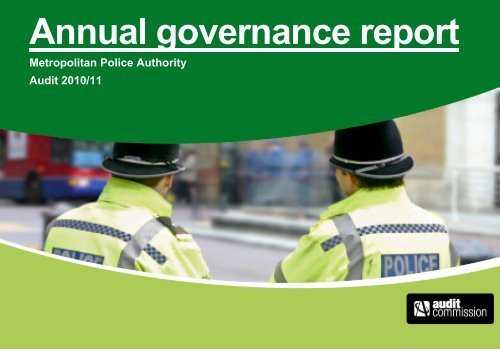
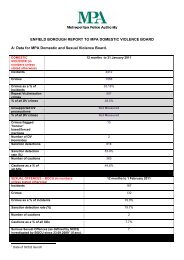
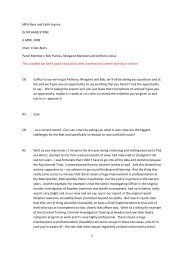
![Appendix 1 [PDF]](https://img.yumpu.com/51078997/1/184x260/appendix-1-pdf.jpg?quality=85)
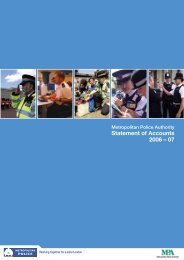
![Transcript of this meeting [PDF]](https://img.yumpu.com/50087310/1/184x260/transcript-of-this-meeting-pdf.jpg?quality=85)
![Street drinking in Hounslow [PDF]](https://img.yumpu.com/49411456/1/184x260/street-drinking-in-hounslow-pdf.jpg?quality=85)
